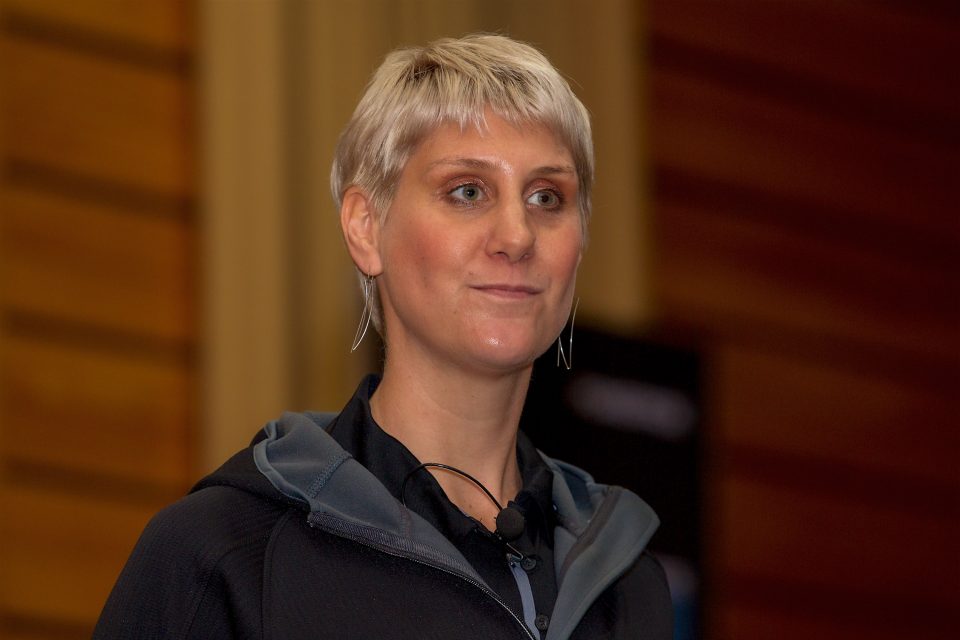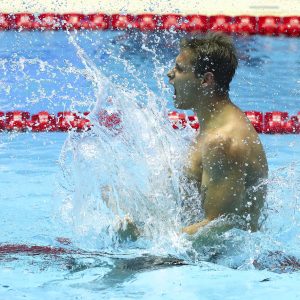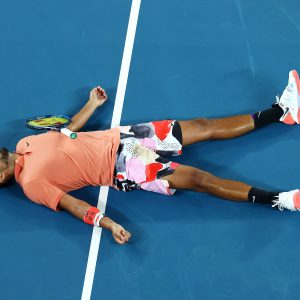The psychologist helping athletes retire
Sports psychologist Kirsten van Heerden, who represented South Africa in swimming at the Commonwealth Games, focuses on athletes’ mental health and life after sport.
Author:
12 February 2021

Relentless training, intensity of competition, the elation of success, and every now and then the disappointment of untimely injuries. That’s what professional athletes know and expect as part of their chosen profession.
But few dwell too much on what comes next, what happens once all that comes to an end. When the thrill of competition and performance is over and retirement beckons.
It’s a frightening prospect, but one with which Kirsten van Heerden is well acquainted. So much so that she wrote about it as the thesis for her doctorate. Van Heerden is one of South Africa’s leading sports psychologists, but unlike many of her peers she has also lived through the complexity of retirement from international sport. She enjoyed a successful career as a swimmer and represented the country at the Commonwealth Games in 2006.
Having called time on the pool, Van Heerden used her experiences to complete her PhD. “I focused on the issue of identity in elite athletes. Too often, athletes begin to see themselves as ‘the swimmer’ or ‘the rugby player’ and nothing else, and can tend to draw their sense of self-worth from this one identity,” she said.
“This adds huge pressure to performance and – my area of interest – it creates challenges when an athlete retires and then has to answer the question: ‘Who am I now?’ My PhD examined how elite athletes saw themselves and confirmed that many had a high, exclusive athletic identity.”

Van Heerden reformatted her research, making it more accessible, to help athletes through the process of retiring from competition.
“I developed the idea of my PhD further by writing a book on retirement from elite sport called Waking From the Dream, because I didn’t want my PhD to be a dusty piece of research on a library shelf and I thought telling stories of transition out of sport would be a good way to help athletes understand and begin thinking about identity. I am definitely going to write an international version, hopefully next year [2021].”
The book features the back stories of 18 top-class South African athletes across a range of sports, such as Olympic medallists Penny Heyns and Hezekiel Sepeng, the late Bafana Bafana star Phil Masinga and cricketing icon Gary Kirsten.
Related article:
“I forgot about tomorrow. I didn’t plan for the future because the present moment was too good. I had to learn that there was life after sport and you needed to prepare for this life,” reads a quote from the book by Sepeng.
Another from Masinga reads: “For 16 years (half your life!) soccer will dominate everything you do; and now, overnight, it’s gone. Waking up outside of that structure is going to be a big challenge. You now have to decide for yourself what to do every day, and what sounds so simple in theory, is so much more difficult in real life, because in the end, all you really want to do is play soccer. Losing the game will create a void in your heart, which will be difficult to fill.”
Van Heerden added: “My best advice is to have at least two dreams, a sporting one and one for life. What I mean is that too many athletes have this childhood dream of being a pro/Olympic athlete and don’t think beyond that. It is an awesome dream to have, but you must know there is a lot of life left to live after retirement and you want to be equally excited about that as you are about your sporting life.”
Working on athletes’ mental strength
The Durban-based clinical psychologist’s interest in how the mind affects athletic performance began early. “I always knew how much my mind played a role in my performance when I was swimming, and through that I became interested in sports psychology.
“You can have all the physical skills, but under pressure if you can’t execute these skills, they mean very little. At the top level everyone is fit, strong, skilful… and what often separates out the winners are their mental skills.”
This correlation is far better understood than in previous years, but Van Heerden said some sports codes in South Africa still have work to do.
“I think there is a growing awareness, but we do have a long way to go. My feeling is that there needs to be a greater awareness of mental skills training at school level. We need to lay better foundations so that by the time athletes reach the top level, they have these skills.
“Interestingly, one of the most professional teams I work with in this regard is the SA polocrosse team, even though they are actually an amateur sport. Unfortunately, in the Olympic codes, and mainly individual sports, there is still no real coordinated programme for athletes to tap into. Most have to seek out help on an individual basis and many can’t afford to see a psychologist.”
Having competed in one of those individual sports, Van Heerden could certainly have benefitted from her own expertise during her racing days. “I often think I wish I knew then what I know now. I think probably the best advice I would give is that in the end, whether you can swim across a pool faster than someone else or not doesn’t change your worth as a person. And maybe I would give a few tips to win some crucial races I lost,” she said with a wry smile.
Related article:
Van Heerden works with a number of individual clients, but also several national teams and organisations, including the South African netball team, Lifesaving South Africa, rugby players’ association MyPlayers as the player development manager for the Sharks, and for the South African Cricketers’ Association as the player development manager for the Dolphins and the Proteas women.
Women’s sport is understandably close to Van Heerden’s heart and a few years ago she founded the Girls Only Project (GOP), whose vision is “to change the sporting landscape within South Africa and Africa to better reflect the ideals and values of equality for all, with a special focus on young women”.
“I founded GOP because I wanted to tell more women-in-sport stories, and to talk about the real issues affecting girls and women in sport, such as body image, mental health or gender norms and expectations.
“I also wanted GOP to be a place that girls and women could come to find relevant information and feel part of a community. We have run a few programmes, but for now we are focusing on a podcast hosted by Lee-Ann Persse, a two-time Olympian, where we interview elite female athletes from around the world. I would like to develop this further next year.
“Also, we are one of the only organisations that focus exclusively on women in sport research. I found a lot of the research was highly academic and I wanted to focus on hearing the voices of the girls and women relating to the challenges they faced. Our findings have been really interesting. For example, it showed that the lack of access to good, inexpensive sports bras was a high issue for girls and women, something so simple that could make a difference.”
The biggest challenge
As for the current state of women’s sport in the country and how it is perceived by the South African public, Van Heerden said: “There is a long way to go, but good progress is being made in sports like cricket and netball in terms of payment and at least getting exposure on TV.
“However, even then, women’s sport is still not represented in the way it should be. I can almost guarantee that if you opened IOL or News24, etc, and looked at the sports section, it would still be 90% focused on men’s sport.
“Of course sponsorship plays a role. More financial backing is needed. The argument is that less people watch women’s sport so of course they shouldn’t get the same sponsorship as the men. But it is a chicken-and-egg scenario. Our argument is that people will watch if it is on TV, and if it is on TV there will be more sponsorship.
“The Women’s World Cup cricket is a great example. Many people watched it, both men and women, but after the World Cup you hardly saw any women’s games on TV. Also, the Women’s World Cup football had great viewership around the world, and a lot of people watch the WTA tennis. What it requires is the collective will of editors to put women in sport in the media.”
Related article:
Sadly, as far as recent media coverage for her former sport is concerned, it’s not the kind you’d want to see. Swimming in South Africa was rocked by the emergence of numerous allegations of abuse by coaches in the sport dating back more than 40 years, with several officials and even the police allegedly turning a blind eye to reports from the victims.
While Van Heerden is reluctant to comment on the specific allegations, she admits to being shocked at the lack of safeguarding within the sport.
“I think safeguarding has been a topic much neglected in sport. [Gymnastics documentary] Athlete A showed us the damage that can be done when proper safeguarding measures are not in place and, more importantly, when victims report abuse but are ignored or dismissed.
“I cannot comment on the recent allegations within swimming, but I am part of Sports Voice, an initiative to provide a comprehensive reporting, education and monitoring tool to federations and clubs. We feel independence is critical when it comes to these matters and we want to provide a safe place for victims to report, as well as helping federations and clubs to make sure they have the correct policies and procedures in place.
“Throughout my swimming career, I cannot remember ever sitting in a safeguarding workshop or being spoken to about safeguarding. Looking back, I am horrified by this. Education and awareness are so important.”
This is why Van Heerden is so determined to make a difference through the Girls Only Project and Sports Voice, which provides athletes with an online platform through which to report abuse. It aims to create a safe sporting environment and bring justice to those who harm athletes.
Where victims were often silenced and ostracised in the past, they can now speak out in a safe space where practical help is available. This is surely a step in the right direction.
Athletes seeking to report abuse can go to the Sports Voice website.



